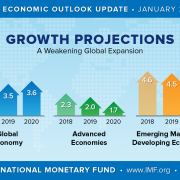Word on the Street – November 27th – December 1st
Word on the Street – November 27th – December 1st
Another brief conversation with our CIO on current events in the investing world…
A sit down with Blake Street, CFA, CFP® to discuss some current events in the news, their impact on investors, and his sentiment on some issues. Enjoy…
Trade War talks are still present as people were worried about the G20 meeting. Since our last conversation, where do you think we are now with the trade talks?
Blake Street: Specific to the US and China, much remains to be seen. At this point, we are still on the light end of threatened tariffs with escalation due here soon without further intervention. In recent days, the President has new motivation to come up with some type of remedy to re-instill confidence in the markets. One way would be to calm US & China trade tensions and get global growth back on track. It remains to be seen if this is the case. As we have seen in the recent past, sometimes these summits result in a lot of talk and no action. The G20 Summit resulted in a “truce” or “ceasefire” of sorts between the US & China, however, very little clarity has been provided and an arrest of the CFO of Huawei, China’s largest tech company, this morning (12/6/2018) could further inflame tensions.
General Motors seems to have suffered greatly due to the tariffs, among other things. Do you think that this is going to be a reoccurring theme for some US companies, or is this just a casualty of war?
B.S.: I don’t know if you can say they suffered greatly, but they are doing what every company should do which is look out for their long-term interests. They have spotted changes in their own market landscape that require a change in where they produce their products and what products they produce for consumers. Tariffs have certainly hurt their bottom line by increasing certain input costs and while this seems obvious in hindsight, a lot of industries from automotive manufacturers to agricultural producers have been harmed by trade tensions and tariffs.
Oil prices are down again as well. How with this impact both consumers at the pump and investors? What do you think the long-term trend will be?
B.S.: Consumers during the holiday season will benefit by keeping more money in their pocket. However, falling crude prices can also come with other adverse impacts such as slowing economies and weak investment markets. Historically, 30% declines in crude oil prices have correlated strongly to short-term bear markets, not always a recession.
Personally, I think the most recent selloff is overdone, and we will return to higher oil prices in the not too distant future. Case and point, I don’t think that demand has dropped off in a meaningful way, and we have not seen the type of supply buildups reminiscent of 2015, the last time we saw oil prices collapse.
On Wednesday (11/28/2018), Jerome Powell, Chair of the Federal Reserve, came out and said that the Fed Funds rate is approaching neutral. This news was a stark contrast to his October statements. What does this mean for the market as we approach 2019?
B.S.: Investors and markets alike were appeased to hear that we may be due for fewer rate hikes than initially priced in. Foreign markets have also been dealing with adverse effects of a strengthening US dollar and rising US interest rates. Markets overseas breathed a sigh of relief to hear of a potentially more accommodative Fed policy.
In my mind, an even bigger question mark is how the Fed continues to handle the unwinding of its balance sheet in the coming years. I’m also slightly concerned with President Trump’s recent politicization of the Fed. At the end of the day, Fed Chair Jerome Powell has a job to do, and it is not solely to provide octane to investment markets at the President’s request. I expect the Fed to remain focused on their traditional mandate and to shirk Presidential pressures.
Warren Street Wealth Advisors, a Registered Investment Advisor. The information contained herein does not involve the rendering of personalized investment advice but is limited to the dissemination of general information. A professional advisor should be consulted before implementing any of the strategies or options presented. Any investments discussed carry unique risks and should be carefully considered and reviewed by you and your financial professional. Past performance may not be indicative of future results. All investment strategies have the potential for profit or loss.








